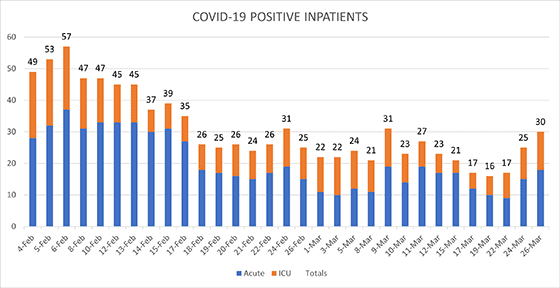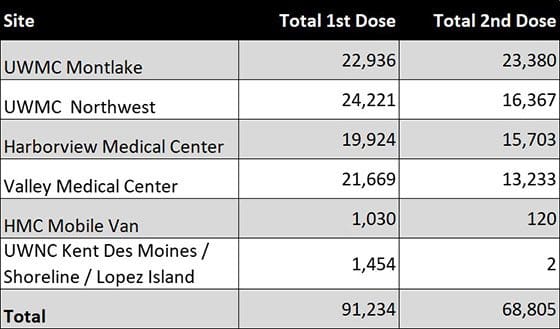Living and working through a pandemic has tested all of us in various ways. The changes and challenges have been real and constant. We have adapted and persevered, put our patients first, and made countless sacrifices for the good of the community. That focus has carried us far.
Recent changes are impacting all aspects of our surroundings. And how we manage those changes could affect the local trajectory of the COVID-19 pandemic in the coming months.
At the state and county levels, we just entered Phase 3 of Governor Inslee’s recovery plan easing some of the restrictions on indoor gatherings and outdoor venues. This comes at the same time we’re seeing a slight uptick in new COVID-19 cases and hospitalizations — some of which are attributable to the concerning rise of viral variants. Unfortunately, these variants of concern appear to be more transmissible, which can lead to faster spread in unvaccinated populations. This is even more reason to remain vigilant. All three of the vaccines are amazingly effective, which makes it critical to get them to everyone as quickly as possible to stop the potentially accelerated transmission of these new variants.
As we look ahead, another big change is coming next Wednesday with the planned opening of Phase 1B tiers 3 and 4 of the state’s vaccine rollout. This phase significantly expands eligibility, including to all people 60 and older, and will likely produce a surge in scheduling requests and waitlist demand. Our vaccine team has done a tremendous job so far, and I know everybody involved is up to the task.
Operationally, the big change of streamlining our electronic inpatient and outpatient health records across UW Medicine begins on Saturday. Destination: One represents an enormous undertaking that will require employees supporting the implementation to work gathered in proximity over the weekend. Please remember the basics of infection prevention — masking, physical distancing, handwashing — to protect against COVID-19 throughout this project rollout. (And thank you to all involved in this important upgrade!). I am looking forward to a safer and more efficient electronic health record for patient care starting this weekend.
These changes are a lot, especially all at once. But if we have learned anything from the past year, it’s that we can face any challenge if we do it together. Let’s all do our part to hold the line and continue the steady progress we’re making into spring.
Today’s update includes:
• Local/National/Global Epidemiology
• Vaccination Summary
• Guidance on Patient Vaccine Scheduling
• Web-Based Tool for Vaccination Clinic Volunteers
UW Medicine COVID-19 Activity Summary

Local/National/Global Epidemiology
King County: Public Health – Seattle & King County is reporting 86,536 total cases and 1,459 deaths as of March 26. The number of new positive tests is currently at 108/14 days/100,000 people. The effective reproductive (Re) number was estimated to be 1.5 (estimate range: 0.4 – 2.7).
Washington: The Department of Health reports 336,547 confirmed cases and 5,213 deaths as of March 24. Of the 5,777,929 people who have been tested, 5.8% have been positive.
United States: The Centers for Disease Control and Prevention reports 65,083 new cases, 29,834,734 total COVID-19 cases and 542,584 deaths as of March 25.
Global: The WHO COVID-19 Dashboard reports 125,160,255 confirmed COVID-19 cases and 2,748,737 deaths as of March 26.
UW Medicine Vaccination Summary as of March 25

*Total Doses Given: 160,039. Site numbers represent total doses administered to employees, patients and community members.
Guidance on Patient Vaccine Scheduling
As our patients seek direction on scheduling first-dose COVID-19 vaccine appointments, below is an overview of the process to help guide these conversations. You may also download and print the UW Medicine handout on patient vaccine scheduling.
Who can schedule: Eligible patients include individuals within the Washington State Department of Health (DOH) Phases 1A and 1B, tiers 1 and 2.
How to schedule: Ambulatory clinics can directly schedule patients for vaccine clinic appointments. Patients may call the Contact Center at 1.844.520.8700 to join an active waitlist.
• When appointment times are available, patients on the waitlist will receive a text or recorded call inviting them to call back for scheduling.
• During the callback, patients have the option to schedule with a CCR or receive a single-use link to schedule online.
• MyChart/eCare scheduling for vaccine appointment scheduling is no longer an option.
Join the standby list: In addition to individuals currently eligible, patients who meet the DOH criteria for Phases 1B, tiers 3 and 4 can join the standby list for extra doses available at the end of each day. To join the list, patients must text ENROLL to 1.844.520.8700.
For up-to-date vaccine information, please remember to consult Frequently Asked Questions About COVID-19 Vaccines for Employees on The Huddle.
Web-Based Tool for Vaccination Clinic Volunteers
UW Medicine has launched a new system for managing schedules and volunteers at our vaccination clinics as well as for sites supported by the UW School of Nursing Vaccination Consortium: https://uwmvaccinationvolunteers.org/default.aspx.
Initially, volunteers are needed for clinical roles, including healthcare professionals and students who can administer vaccines. The system will also allow us to add non-clinical roles, including greeters, wayfinding, runners and general support, in the future.
The site will be updated with new roles and shifts on Friday afternoons. Please check back weekly if you are interested in volunteering. Due to the training required to work in a variety of vaccine clinic settings, roles will be assigned preferentially to volunteers who are available for multiple shifts. UW Medicine employees will be paid the appropriate rate of pay for picking up shifts at a UW Medicine vaccine clinic.
For more information, please email uwmcovid19volunteers@uw.edu.
As businesses nationwide continue to open back up, we are sadly seeing more heartbreaking news of violence in public places, this week with the senseless massacre at a Colorado supermarket. Amidst the stress and fatigue of the ongoing pandemic, it is so difficult to fathom how even more unconscionable acts like this continue to happen in our country. And again, we find ourselves in a moment of recognizing the unimaginable toll such tragedy takes on the families and communities of the lives lost. As always, check in with your friends, family members and colleagues. Often a small gesture of concern can go a long way.
We will be taking a break with our COVID-19 updates next week. When we resume in April, I hope we are seeing more true signs of spring. Thank you, as always, for continuing to stay the course — in support of each other, our patients and community. We are in this together and our perseverance only makes us stronger.
Sincerely,
John Lynch, MD, MPH
Medical Director, Infection Prevention & Control
Associate Medical Director, Harborview Medical Center
Division of Allergy & Infectious Diseases, UW School of Medicine

